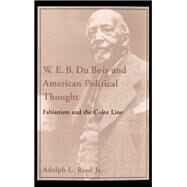W. E. B. Du Bois and American Political Thought Fabianism and the Color Line
, by Reed, Adolph L.- ISBN: 9780195051742 | 0195051742
- Cover: Hardcover
- Copyright: 10/30/1997
This groundbreaking study of W.E.B. Du Bois simultaneously analyzes thepolitical thought of one of the leading black American intellectuals andactivists of this century, provides a model for the study of the history ofpolitical thought, and by examining recent Du Bois scholarship, offers apenetrating interpretation of contemporary black thought.The book departs from existing Du Bois scholarship by locating the sources of DuBois's thinking in the cauldron of reform-oriented American intellectual life atthe end of the nineteenth century, and follows through the course of his careerthe ways that his early commitments persisted in his basic views regarding suchpivotal issues as the relation of science and progress, social stratificationamong black Americans and in general, and rational social organization. While DuBois's substantive political programs changed over time, for example, in hissupport for defensive organizing behind the walls of segregation during the1930s and his rapprochement with the Communist left in his last two decades,Reed argues that those changes do not reflect fundamental or epiphanic shifts inthe structure of his thinking but were pragmatic responses to concrete politicalcircumstances. When situated within their own constitutive contexts, thesechanging responses reveal their compatibility, if not coherence, with Du Bois'sbasic, essentially Fabian socialist worldview as first elaborated in ThePhiladelphia Negro.W.E.B. Du Bois and American Political Thought's interpretation of Du Bois isalso an argument about the fundamental connections between Afro-Americanpolitical debate and broader patterns of political discourse. This argument islinked to a path-breaking critique of dominant tendencies in Afro-Americanintellectual historiography and their ideological foundations, as well as to asophisticated argument in support of an alternative, historically generativistapproach to the study of the history of political thought.






